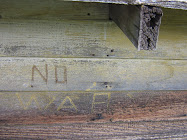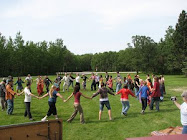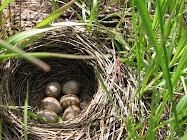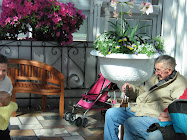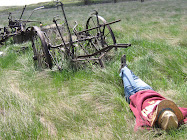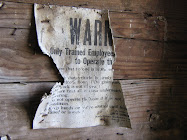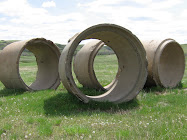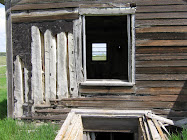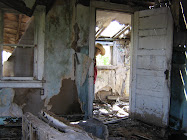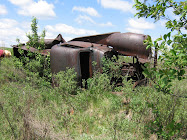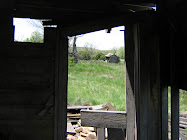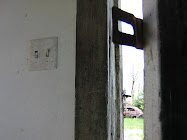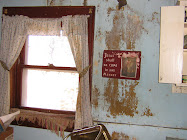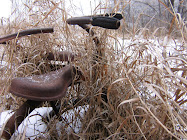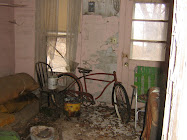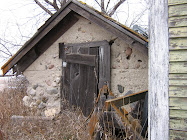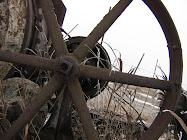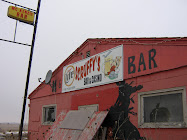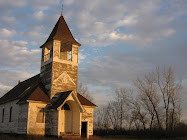© 2009 by Karen Van Fossan
Strangers of War
There was a woman whose name
I have never known.
The syllables of her name would have been sharp against my tongue,
had I ever tried to pronounce them,
which I did not.
The woman was not my friend.
Her God was not my friend –
nor her sisters, nor her brothers, nor the children of her home.
She rose from soil I have never seen,
singing a prayer
I will never sing,
wiping the hands of children I do not recognize.
The secrets in her eyes will never
flash upon my eyes –
holding hope, like laughter,
in our throats.
The woman was not my friend –
nor her sisters.
Her brothers held their arms against
my brothers.
My neighbors sent soldiers
across the sea
to fight her neighbors.
We were enemies, they said.
She was my enemy, they said.
Never, not for a moment, did I believe them.
The syllables of my name would have been sharp against her tongue.
And yet –
I miss her.
Wednesday, December 16, 2009
Monday, December 14, 2009
Thank You
Thank you for all the kind and hopeful words I've received since posting my letter to President Obama. Since my last post, CODEPINK Women for Peace picked up my letter and ran it on their Pink Tank blog. (Somehow, I got the whole thing down to 600 words.) The comments on Pink Tank are pretty interesting, and you might be interested to read them.
Peace to you,
Karen
Peace to you,
Karen
Monday, December 7, 2009
Dear President Obama From a Neighbor
Written upon the President's Announcement of Another Surge of Troops in Afghanistan
December 2, 2009
© 2009 Karen Van Fossan
Dear President Barack Obama,
You may not be aware of this, but you and I have plenty of things in common. True, I've never been elected president of the United States, and you've never been elected president of the North Dakota Peace Coalition. But I do hope your tenure as president will be as informative as mine was.
In any case, I'd like to list just four of the things you and I have in common:
1)We have each devoted our time, energy, and heart to the people of Chicago.
2)We have each spoken openly about our vision of a nuclear-weapons free future.
3)We each opposed the Iraq war and occupation from the beginning.
4)We each hold to “hope” as an ideal in the world.
Certainly, you and I don't agree on all political and social matters. I felt immense relief when Chicago's bid to host the 2016 Olympics – and bear its subsequent hardships – was eliminated. Also, when I heard you speak here in North Dakota last April, I was the lone voice boo-ing as you called the war in Afghanistan “the good war.”
I would be mortified if an audience member booed at me, so now, as I write this letter, I feel some compunction to apologize for booing at you. The trouble is, I was not then – and am not now – certain how to be heard by the leaders of my country.
I have called the White House innumerable times to register my concern about your Afghanistan plans. During the weekdays, the phone lines were invariably busy. Over the weekend, the message stated that your mailbox was full. When I did break through the White House telephone traffic, the on-hold message told me that the volunteer operators would answer as soon as they were able.
While on hold, awaiting a volunteer operator, I had time to consider many questions: Why does our White House have so few phone lines? Why does our White House have such limited mailbox space? Why does our White House rely on unpaid volunteers to respond to calls from the American people?
Frankly, I wanted to boo all over again.
And frankly, there are endless reasons why the war in Afghanistan should never be called “the good war.” As you must certainly know, these reasons have names, and these reasons have faces.
Unfortunately, I don't know their names, and I don't recognize their faces. So their stories aren't mine to tell.
What I can tell you is a story of Chicago.
In 2001, my partner and I moved from Chicago's Hyde Park neighborhood (on the south side) to the Rogers Park neighborhood (on the north side). In the middle of this move, on September 11, the World Trade Center in New York was attacked by self-proclaimed terrorists from another country – or countries.
As I was grieving this event, the radio news told of another tragedy. A young girl had been shot to death in the lobby of her apartment building, caught in Chicago's gang crossfire.
I spent many nights hollering into the wind, over gangs and war and violence.
Today, I still grieve, though on December 2, 2009, I have a bit more clarity.
The child who lived on the south side was murdered by a gang. Let's just say this gang was from the north side, where I lived. Certainly, someone in the south-side gang might have known this child, might have grieved for this child. The south-side gang might have declared war against the north side.
This isn't fair, of course. I had nothing to do with the shooting. In fact, I abhorred the shooting. Just because a gang sought refuge in my neighborhood didn't mean that I was giving refuge. I didn't want the gang in my neighborhood. And I certainly didn't want gang warfare.
Similarly, there is a gang known as al Qaeda. Their leader has claimed responsibility for the attacks of September 11. They entered the United States' neighborhood, and they killed people. In doing so, they represented no particular government, no particular country, and hence, no particular people. To attack the country in which they have taken refuge – to harm the innocent people who are their neighbors – is to behave as a gang.
For more than 8 years I have wondered – Is the United States behaving as a gang or a government?
A government could make use of a police force, trained in precision, to find the alleged attackers, bring charges against them, and serve the greater justice. You and I both know that the government of Chicago doesn't have the best reputation, and neither does its police force. But a government, unlike a gang, has a degree of public accountability. By design, it represents the people.
Thankfully, the south side never bombed the north side, no matter whether we harbored an enemy gang. But let's just say the south side had attacked us. Let's say they'd been attacking us for 8 or more years. Let's say, all the while, the south-side folks were growing weary of war.
Then – a voice. A south-side visionary. A person who declares, “Yes, we can!” – even if he borrows that phrase from Delores Huerta of the United Farm Workers.
This south-side visionary speaks of hope, the audacity of hope, a future of promise for the children. He offers the people renewal – of the economy, the environment, international relations. He rails against his predecessors' warring predilections. In the mean time, yes, he does call the north-side war “the good war.” But nobody's perfect, and here is a person who's poised and ready to listen. A leader like this would never drown his people in endless war.
And so he's elected. Of course, he's going to listen. Of course, it will make a difference that 55% of his people want to end the war – win, lose, or otherwise.
But suddenly, this leader's phone is busy. Suddenly, his mailbox is full.
Has he forgotten we're all neighbors?
Has he forgotten “Yes, we can”?
Does he think he was elected to kill people?
This is my greatest fear:
The audacity of hope has truly become an audacity – especially for the children of Afghanistan.
Sincerely,
Karen Van Fossan,
a neighbor
December 2, 2009
© 2009 Karen Van Fossan
Dear President Barack Obama,
You may not be aware of this, but you and I have plenty of things in common. True, I've never been elected president of the United States, and you've never been elected president of the North Dakota Peace Coalition. But I do hope your tenure as president will be as informative as mine was.
In any case, I'd like to list just four of the things you and I have in common:
1)We have each devoted our time, energy, and heart to the people of Chicago.
2)We have each spoken openly about our vision of a nuclear-weapons free future.
3)We each opposed the Iraq war and occupation from the beginning.
4)We each hold to “hope” as an ideal in the world.
Certainly, you and I don't agree on all political and social matters. I felt immense relief when Chicago's bid to host the 2016 Olympics – and bear its subsequent hardships – was eliminated. Also, when I heard you speak here in North Dakota last April, I was the lone voice boo-ing as you called the war in Afghanistan “the good war.”
I would be mortified if an audience member booed at me, so now, as I write this letter, I feel some compunction to apologize for booing at you. The trouble is, I was not then – and am not now – certain how to be heard by the leaders of my country.
I have called the White House innumerable times to register my concern about your Afghanistan plans. During the weekdays, the phone lines were invariably busy. Over the weekend, the message stated that your mailbox was full. When I did break through the White House telephone traffic, the on-hold message told me that the volunteer operators would answer as soon as they were able.
While on hold, awaiting a volunteer operator, I had time to consider many questions: Why does our White House have so few phone lines? Why does our White House have such limited mailbox space? Why does our White House rely on unpaid volunteers to respond to calls from the American people?
Frankly, I wanted to boo all over again.
And frankly, there are endless reasons why the war in Afghanistan should never be called “the good war.” As you must certainly know, these reasons have names, and these reasons have faces.
Unfortunately, I don't know their names, and I don't recognize their faces. So their stories aren't mine to tell.
What I can tell you is a story of Chicago.
In 2001, my partner and I moved from Chicago's Hyde Park neighborhood (on the south side) to the Rogers Park neighborhood (on the north side). In the middle of this move, on September 11, the World Trade Center in New York was attacked by self-proclaimed terrorists from another country – or countries.
As I was grieving this event, the radio news told of another tragedy. A young girl had been shot to death in the lobby of her apartment building, caught in Chicago's gang crossfire.
I spent many nights hollering into the wind, over gangs and war and violence.
Today, I still grieve, though on December 2, 2009, I have a bit more clarity.
The child who lived on the south side was murdered by a gang. Let's just say this gang was from the north side, where I lived. Certainly, someone in the south-side gang might have known this child, might have grieved for this child. The south-side gang might have declared war against the north side.
This isn't fair, of course. I had nothing to do with the shooting. In fact, I abhorred the shooting. Just because a gang sought refuge in my neighborhood didn't mean that I was giving refuge. I didn't want the gang in my neighborhood. And I certainly didn't want gang warfare.
Similarly, there is a gang known as al Qaeda. Their leader has claimed responsibility for the attacks of September 11. They entered the United States' neighborhood, and they killed people. In doing so, they represented no particular government, no particular country, and hence, no particular people. To attack the country in which they have taken refuge – to harm the innocent people who are their neighbors – is to behave as a gang.
For more than 8 years I have wondered – Is the United States behaving as a gang or a government?
A government could make use of a police force, trained in precision, to find the alleged attackers, bring charges against them, and serve the greater justice. You and I both know that the government of Chicago doesn't have the best reputation, and neither does its police force. But a government, unlike a gang, has a degree of public accountability. By design, it represents the people.
Thankfully, the south side never bombed the north side, no matter whether we harbored an enemy gang. But let's just say the south side had attacked us. Let's say they'd been attacking us for 8 or more years. Let's say, all the while, the south-side folks were growing weary of war.
Then – a voice. A south-side visionary. A person who declares, “Yes, we can!” – even if he borrows that phrase from Delores Huerta of the United Farm Workers.
This south-side visionary speaks of hope, the audacity of hope, a future of promise for the children. He offers the people renewal – of the economy, the environment, international relations. He rails against his predecessors' warring predilections. In the mean time, yes, he does call the north-side war “the good war.” But nobody's perfect, and here is a person who's poised and ready to listen. A leader like this would never drown his people in endless war.
And so he's elected. Of course, he's going to listen. Of course, it will make a difference that 55% of his people want to end the war – win, lose, or otherwise.
But suddenly, this leader's phone is busy. Suddenly, his mailbox is full.
Has he forgotten we're all neighbors?
Has he forgotten “Yes, we can”?
Does he think he was elected to kill people?
This is my greatest fear:
The audacity of hope has truly become an audacity – especially for the children of Afghanistan.
Sincerely,
Karen Van Fossan,
a neighbor
Subscribe to:
Comments (Atom)
